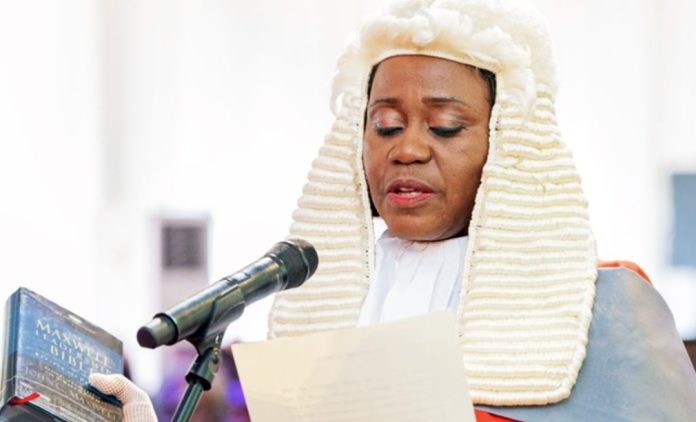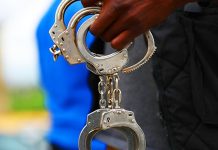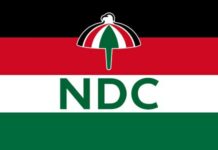President John Dramani Mahama has removed the Chief Justice, Her Ladyship Justice Gertrude Araba Esaaba Sackey Torkornoo from office with immediate effect, following the recommendation of a constitutional committee established under Article 146 of the 1992 Constitution.
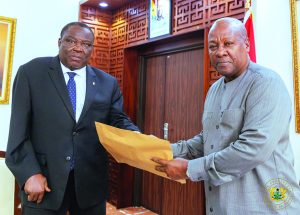
The decision comes barely hours after the President received a report from a five-member committee set up under Article 146(6) to investigate petitions submitted by private citizens, Daniel Ofori, The Shining Stars of Ghana and ACP Ayamga Yakubu Akolgo, for the Chief Justice’s removal.
A statement signed by Presidential Spokesperson, Felix Kwakye Ofosu, and released on September 1, 2025 confirmed that President Mahama had acted in accordance with Article 146(9), which compels the President to follow the recommendations of such a committee.
“After considering the petition and the evidence, the Committee found that the grounds of stated misbehaviour under Article 146(1) had been established and recommended her removal from office,” the statement said.
The Petitions and Committee’s Work
The Committee, chaired by Supreme Court Justice Gabriel Pwamang, included Justice Samuel Adibu-Asiedu (Supreme Court), former Auditor-General Daniel Yaw Domelevo, Major Flora Bazaanura Dalugo of the Ghana Armed Forces and Professor James Sefah Dzisah of the University of Ghana.
The Committee reportedly reviewed thousands of pages of documentary evidence and witness testimonies.
Although it has concluded its work on only the first of three petitions, its recommendation based on the petition by Daniel Ofori proved sufficient for the Chief Justice’s removal.
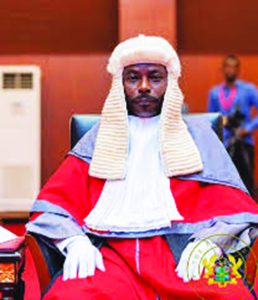
Daniel Ofori accused the Chief Justice of financial misappropriation amounting to GH¢261,890 and US$30,000 during official foreign trips, claiming the funds were improperly used to cover the travel expenses of her husband and daughter.
The other two petitions, one from the civil society group, Shining Stars of Ghana and another from Assistant Commissioner of Police Ayamga Yakubu Akolgo remain under inquiry. Proceedings on the second petition have been adjourned, following a joint request from both the petitioner and the Chief Justice.
“A Historic Miscarriage of Justice”
In a fiery public statement and press conference early this year, the now removed Chief Justice fiercely defended her conduct and slammed the removal process as unconstitutional and politically motivated.
Describing the proceedings as a “historic miscarriage of justice,” Justice Torkornoo claimed her removal sets a dangerous precedent for the independence of the judiciary in Ghana.
“Every step of the removal process breaks the rules of how justice is delivered in this country,” she said, adding “this process, if allowed to stand, will forever change how judicial officers are treated in this republic.”
She detailed several grievances, including denial of access to key documents used in her trial, refusal to allow her counsel full participation, conducting hearings in a high-security military zone at Adu Lodge, instead of a judicial facility and denial of her request for an open hearing.
She also alleged targeting and intimidation based on her family history, referencing the 1981 murder of her uncle, Major Sam Acquah, whose killing was linked to the same Adu Lodge venue.
Legal Pushback and International Appeal
Justice Torkornoo has since filed a $10 million lawsuit against the Government of Ghana at the ECOWAS Court of Justice, seeking compensation for damage to her reputation and for alleged violations of her human rights.
She also challenged the legality of her suspension and removal in both the Supreme and High Courts of Ghana, but those efforts were struck out or dismissed.
Reactions and Implications
The removal of a sitting Chief Justice is unprecedented in Ghana’s 68-year post-independence history.
Legal scholars and political analysts are split, with some hailing the decision as a commitment to accountability and others warning of deep political overreach and erosion of judicial independence.
Vincent Ekow Assafuah, Member of Parliament for Old Tafo, has called the move “constitutionally questionable” and is among several lawmakers pushing for legislative reforms to clarify Article 146 proceedings.
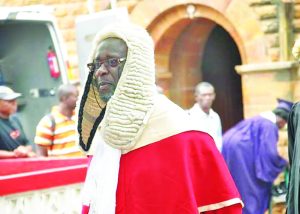
In accordance with Ghanaian constitutional law, a judge removed for misconduct is not entitled to retirement benefits, including pension and gratuity. This means Justice Torkornoo may forfeit all end-of-service emoluments unless a future legal or political resolution overturns the decision.
Legal analysts have pointed to the Justice Edward Boateng and Justice Frank Amoah cases as key precedents in determining post-removal entitlements, though neither involved a sitting Chief Justice.
Background on Justice Torkornoo
Justice Gertrude Torkornoo was appointed to the Supreme Court in 2019 and became Ghana’s 15th Chief Justice in 2023. A veteran of 38 years in the legal profession, she was seen by many as a reformist and advocate for transparency in the judiciary.
Her removal may trigger national debate over constitutional reforms, judicial independence, and the separation of powers in Ghana’s democracy.

